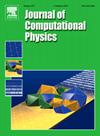A multiscale stochastic particle method based on the Fokker-Planck model for nonequilibrium gas flows
IF 3.8
2区 物理与天体物理
Q2 COMPUTER SCIENCE, INTERDISCIPLINARY APPLICATIONS
引用次数: 0
Abstract
The Fokker-Planck (FP) model characterizes the intermolecular collisions as continuous stochastic processes in velocity space. Compared to the Direct Simulation Monte Carlo (DSMC) method, which is grounded in the Boltzmann equation, the stochastic particle method based on the FP model, referred to as the SP-FP method, demonstrates a relative improvement in computational efficiency. However, the traditional SP-FP method, utilizing operator splitting scheme, encounters analogous limitations to DSMC, thereby limiting the application of large temporal-spatial discretization for simulating near-continuum and continuum flows. In this study, two critical advancements are introduced to improve the traditional SP-FP method. First, the exact integration scheme of the ellipsoidal-statistical FP (ESFP) model is derived, enabling the replication of the theoretical solutions for homogeneous relaxation with any time step. Furthermore, leveraging the integration scheme of the ESFP model, we propose a Multiscale Stochastic Particle (MSP) method. The MSP method quantifies the numerical errors stemming from the operator splitting scheme and corrects them in the relaxation step. This capability allows the MSP method to be employed with larger temporal-spatial discretization for inhomogeneous problems, achieving second-order accuracy while retaining implementation simplicity. Application of the MSP method to various benchmark problems, including Couette flow, Fourier flow, Poiseuille flow, Sod tube flow, Lid-driven cavity flow, and flow through a slit, demonstrates its promise for simulating multiscale nonequilibrium gas flows with high computational efficiency and accuracy.
基于福克-普朗克非平衡气体流模型的多尺度随机粒子法
福克-普朗克(FP)模型将分子间碰撞描述为速度空间中的连续随机过程。与基于玻尔兹曼方程的直接模拟蒙特卡罗(DSMC)方法相比,基于 FP 模型的随机粒子方法(简称 SP-FP 方法)在计算效率上有了相对的提高。然而,传统的 SP-FP 方法采用算子分割方案,遇到了类似于 DSMC 的限制,从而限制了大时空离散法在模拟近连续流和连续流中的应用。在本研究中,引入了两个关键进展来改进传统的 SP-FP 方法。首先,推导出了椭球统计 FP(ESFP)模型的精确积分方案,从而能够以任意时间步长复制均质松弛的理论解。此外,利用 ESFP 模型的积分方案,我们提出了多尺度随机粒子(MSP)方法。MSP 方法可量化算子分割方案产生的数值误差,并在松弛步骤中对其进行修正。这种能力使得 MSP 方法可以在非均质问题上采用更大的时空离散度,在实现二阶精度的同时保持实施的简便性。将 MSP 方法应用于各种基准问题,包括 Couette 流动、Fourier 流动、Poiseuille 流动、Sod 管流动、Lid 驱动空腔流动和通过狭缝的流动,证明了该方法有望以高计算效率和精度模拟多尺度非平衡气体流动。
本文章由计算机程序翻译,如有差异,请以英文原文为准。
求助全文
约1分钟内获得全文
求助全文
来源期刊

Journal of Computational Physics
物理-计算机:跨学科应用
CiteScore
7.60
自引率
14.60%
发文量
763
审稿时长
5.8 months
期刊介绍:
Journal of Computational Physics thoroughly treats the computational aspects of physical problems, presenting techniques for the numerical solution of mathematical equations arising in all areas of physics. The journal seeks to emphasize methods that cross disciplinary boundaries.
The Journal of Computational Physics also publishes short notes of 4 pages or less (including figures, tables, and references but excluding title pages). Letters to the Editor commenting on articles already published in this Journal will also be considered. Neither notes nor letters should have an abstract.
 求助内容:
求助内容: 应助结果提醒方式:
应助结果提醒方式:


